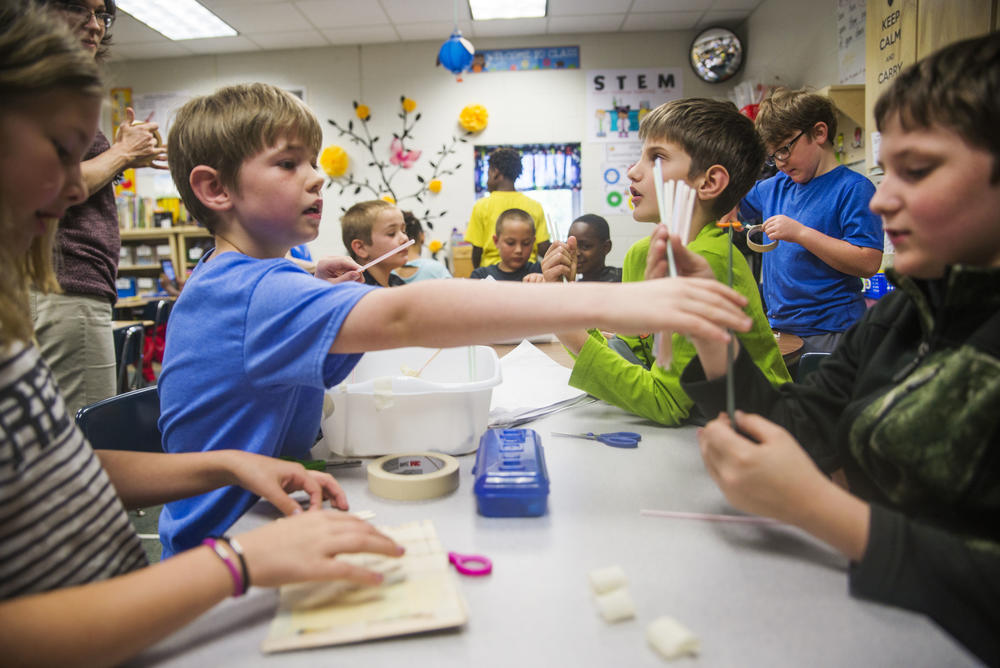Section Branding
Header Content
How Is Atlanta Training The Next Generation Of Tech Workers?
Primary Content
First-graders at The Lovett School in Atlanta are learning geometry a bit differently than usual. They’re building three-dimensional cubes, using any materials they choose.
How Is Atlanta Training The Next Generation Of Tech Workers?
This approach follows a method The Lovett School calls “exploration based” learning. That is exactly the kind of method that State Superintendent Richard Woods looks for in educational programs.
“Put reality within their education, and let them become problem solvers," Woods said. "Ultimately, that’s what we want: individuals that use their imagination to dream big, think big, and do big things for themselves.”
At The Lovett School, kids look at big flat screen TVs for diagrams; some older students get to use laptops provided by the school.
Laura Deisley, Lovett's Director of Strategic Innovation, believes this technology is crucial for the future of the students.
“I think a lot of the work that we’re doing right now as a school, is making sure that we’re staying abreast of what’s happening in the world that will affect our students," said Deisley.
She also said the demand for technology jobs is growing, and there’s one question that drives the Lovett curriculum:
“Where’s the next economy coming from? And it’s often gonna be kids coming along who are passionate, who are technologically capable," said Deisley.
Lovett offers classes like basic coding and robotics from grades K through 12. But after high school, how do young adults join the digital workforce? One answer is the TechHire Initiative, a federal program that trains people for the rising number of computer-related jobs.
Atlanta is currently among the top cities with the greatest supply and demand gap in internet technology jobs. It’s projected there will be 1 million more tech jobs than computer science students in the US by 2020.
The White House grants the TechHire designation to cities it recognizes as a top locale for tech growth. TechSquare Labs is one of three organizations slated to see the program transpire in Atlanta. Rodney Sampson of Tech Square Labs thinks this opens up huge potential.
“We have all the pieces to really be that tech capitol of the South," Sampson said.
He also said Atlanta has the ability to pave the way for tech innovation. He feels the city is positioned to educate an entire generation like none other before it.
“Well imagine if companies would train a workforce to be innovative at the entry level," said Sampson.
The Iron Yard does that by providing the training for TechHire. The school offers a full time, three month boot camp. Michael Sterling of the Atlanta Workforce Development Agency said that rapid training is key.
“And so we can really work and readily qualify individuals in months, rather than years for these jobs," said Sterling.
He also says one issue with traditional education is the virtual disconnect between employer and employee. The TechHire program is unique, because it gives students an edge by putting them in direct contact with tech companies.
“We’ve got a group of employers, in partnership with Iron Yard, who tell us exactly what their needs are; where they need individuals trained," Sterling said. "And then we go and train individuals in the specific occupations that the employers tell us they need additional training in.”
Sterling believes TechHire is the best way to close the IT job gap in Atlanta. As demand for tech jobs has increased over the years, proper training to satisfy that need has lagged.
For many young adults, TechHire can be a valuable alternative to a four-year college. Ashby Thornwell is an Iron Yard grad who decided against the typical college route.
“If I went to Georgia Tech, I would need to spend four years learning languages I wouldn’t necessarily use," Thornwell said.
Thornwell develops mobile apps for iOS and Android. To get to that point, she had to learn programming languages like Objective-C and Swift, something she knew Iron Yard could provide quickly.
“I have friends who graduated from four-year computer science degrees, and they never touched Objective-C or Swift," said Thornwell.
She also says the boot camp method is a better investment, because students spend less time and money in school. And Thornwell believes that these days it’s skill, and not a degree, that gets you a job.



